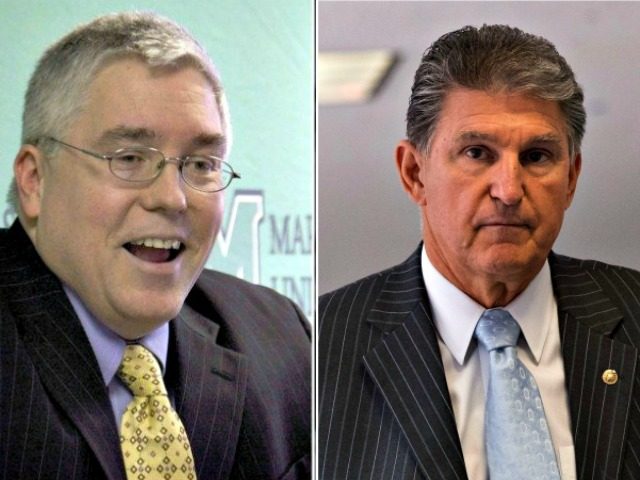A poll released on Friday exclusively to Breitbart News by Gravis Marketing shows Sen. Joe Manchin (D-WV) currently leads the Republican party’s nominee, State Attorney General Patrick Morrisey, by 13 points, 53 percent to 40 percent, in a head-to-head match up for the U.S. Senate seat in West Virginia five months before the November general election.
The poll of 543 likely voters was conducted on May 22 and has a margin of error of 4.2 percent.
When coal magnate Don Blankenship is added as a third party candidate, Manchin’s lead over Morrisey remains virtually unchanged. With Blankenship in the race, Manchin leads Morrisey by 12 points, 51 percent to 39 percent, with Blankenship pulling in a mere 5 percent.
Blankenship, who finished in third place in the May 8 Republican primary, has threatened to enter the race in November as a third party candidate. He may face a legal challenge if he does make that move, under the terms of West Virginia’s “sore loser” law.
President Trump scored a resounding victory over Hillary Clinton in West Virginia in 2016, winning by a 46 point margin, 68 percent to 26 percent.
The president remains very popular in the state, with 58 percent of poll respondents approving of his job performance and 41 percent disapproving, a net positive approval rating of 17 percent.
While Manchin is considered one of the most vulnerable of the ten Democratic senators up for re-election in 2018 in states won by President Trump, the results of the Gravis Marketing poll should send a warning sign to the Morrisey campaign and Republicans that it will be no easy task to unseat the wily veteran Democratic legislator, who has served both as governor of West Virginia and has represented the state in the United States Senate.
In his voting behavior, Manchin has attempted to thread the needle so that he does not align himself with the far left wing of the Democrat Party that opposes every element of the Trump agenda.
Manchin has supported President Trump by voting to confirm Neil Gorsuch’s nomination to the Supreme Court , but has also opposed him by voting against the Tax Cuts and Jobs Act, which passed the Senate by a 51 to 48 margin and was signed into law by the president in December.
That approach has worked, to some degree, for Manchin.
Forty-nine percent of those polled approve of his job performance in the U.S. Senate, and 48 percent disapprove, a net positive approval rating of 1 percent.
While Manchin’s job approval rating among likely West Virginia voters is well below that of the president’s it is significantly better than Morrisey’s which is under water.
Only 34 percent of those polled approve of Morrisey’s job performance, while a whopping 55 percent disapprove, a net negative approval rating of 22 percent.
This negative public perception of Morrisey among many voters in a state where President Trump is so popular was not helped by the negative attack ads launched against him by his primary opponent, establishment Republican Rep. Evan Jenkins.
Morrisey’s track record has been strongly supportive of the Trump agenda. Indeed, no State Attorney General in the country has been a more forceful and effective litigator on behalf of ending overreaching Obama era regulations than Morrisey.
That record of pro-Trump agenda accomplishments, however, has yet to be communicated effectively by the Morrisey campaign to the broad base of voters beyond conservative Republicans in the state.
Five months is a long time in any campaign, but in the West Virginia Senate race, Morrisey has his work cut out for him if he wants to be sworn in as a U.S. senator from West Virginia in January 2019.
Forty-three percent of poll respondents were Democrat, 35 percent were Republican, and 22 percent were Independents or in another party.
Ninety-five percent where White/Caucasion, 2 percent were African-American, 1 percent were Hispanic and 2 percent were “other.”
Thirty-nine percent self-identified as Evangelical Christian, 35 percent were non-Evangelical Protestant/Non-Denominational Christian, 7 percent were Catholic, 1 percent were Jewish, and 18 percent were religiously unaffiliated.

COMMENTS
Please let us know if you're having issues with commenting.